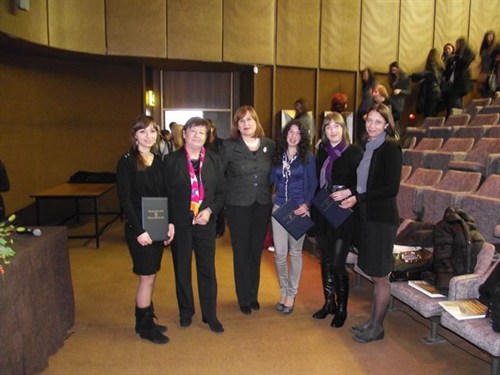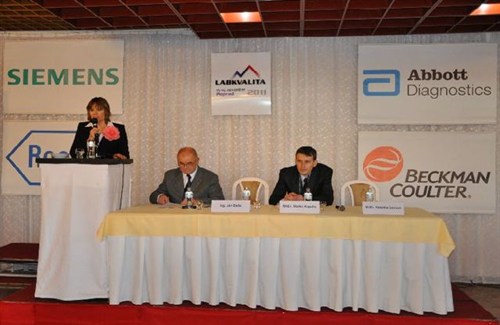News from Regional Federations and National Associations

News from the Polish Society of Laboratory Diagnostics |
| Contributed by Professor Grazyna Sypniewska, IFCC National Representative |
|
December 2011: First Joint Conference of the Polish Society of Laboratory Diagnostics and Polish Diabetology Society
Prof. Grazyna Sypniewska
The Polish Society of Laboratory Diagnostics and the Polish Diabetology Society held their first joint conference with the theme "There is no diabetology without laboratory diagnostics" in Warsaw on December 14th with a video-transmission to other two cities: Bydgoszcz and Wroclaw, allowing to reach approximately 400 diabetologists, clinical biochemists and medical students. Dr. David B. Sacks, from the National Institute of Health (Bethesda, USA), and international expert in the field of laboratory tests in the diagnosis of diabetes mellitus and the first author of the 2011 guidelines and recommendations on the quality of laboratory tests in the diagnosis of diabetes mellitus, delivered the inaugural talk. It was followed by by two presentations on HbA1c "HbA1c measurements - out of the chaos" (W.Gernand) and "HbA1c - a new marker in the diagnosis of diabetes mellitus - should it be introduced in Poland?- pros and contras" (M.T.Malecki, L.Czupryniak). Other talks covered the whole field of diagnosis in diabetes from "Diabetes in children - differences in diagnostics and treatment monitoring" (P.Jarosz-Chobot) , "Detecting of gestational diabetes - time to the new algorithm? (K.Cypryk), and "Disturbances of bone turnover in diabetes and their biochemical evaluation" (G.Sypniewska), "Diabetes kidney disease" (D.Moczulski) through "Assessment of insulin resistance - possible, necessary? (I.Kowalska), "Dyslipidemia in diabetes" (L.Klosiewicz-Latoszek) up to "Monitoring of diabetes treatment - real time and retrospective assessment of glycemia" (B.Solnica) and "Molecular testing in diabetes - today, tomorrow, the day after tomorrow" (T.Klupa). Participants affirmed that the Conference was a frank success, and Presidents of both Societies, the main organizers and responsible for the scientific program, declared that such joint meetings will be held in the future. It is important to underline that Dr. Sacks' visit in Poland was made possible through the support of the IFCC VLP program. |
||||
|
|
||||
News from the Australasian Association of Clinical Biochemists |
||||
|
Contributed by Sandra Klingberg, Chair AACB Media and Communications Committee; |
||||
|
AACB News - Looking Back to Look Ahead
Sandra Klingberg 2011 has been a year of milestones for The Australasian Association of Clinical Biochemists (AACB), the most notable of these being the celebration of 50 years since the formation of the AACB in May 1961.
Other significant milestones for the AACB include the induction of a new President Dr Andrew St John and a new Chief Executive Officer (CEO), Mr Peter Graham.
Dr Andrew St John presenting Mr Tony Prior with his Outstanding Service Medallion Key issues and highlights noted in these two reports included:
The relocation of the Office has also brought about another of the significant changes to the 'face' of the AACB in 2011 with the recent retirement of our CEO, Mr Tony Prior. The AACB is indebted to Tony's dedicated service over the last ten years, which was recognized with the presentation of an outstanding service medallion at the annual scientific meeting. The good news is that we have a new CEO in Mr Peter Graham who brings a wealth of laboratory and management experience with him. The AACB looks forward to long and productive working relationship with Peter as we move forward into our next 50 years! |
||||
News from the Society of Medical Biochemists of Serbia |
||||
|
Contributed by Dr. Snežana Jovičić, Member of the IFCC eNews Working Group |
||||
|
The XIV Annual Scientific Conference "Professor Ivan Berkeš"
The 2011 Annual Scientific Conference "Professor Ivan Berkeš" was held on December 1st at Military Medical Academy in Belgrade. As it is customary, the lecturers were clinical laboratory professionals who have defended their doctoral thesis in the course of the past year at the Faculty of Pharmacy and Faculty of Medicine. This year, they were: Dr Janko Pejović (Military Medical Academy, Belgrade), Dr Marijana Dajak (Faculty of Pharmacy, University of Belgrade), Dr Jasenka Laloš-Miljuš (Faculty of Medicine, University of Banja Luka) and Dr Jelena Popović (Faculty of Medicine, University of Niš). This Annual Scientific Conference and Fund "Professor Ivan Berkeš" was established to honor life and work of professor Ivan Berkeš, one of the founders of medical biochemistry in former Yugoslavia. He taught medical biochemistry at Universities in Zagreb, Skopje and Belgrade. His work at the Faculty of Pharmacy of the University of Belgrade was in great part directed towards the definition and foundation of the specialist studies program. Also, professor Berkeš introduced Clinical Enzymology as an independent discipline. With over 200 publications, mentoring of 150 specialists in medical biochemistry and several tens of doctoral candidates, professor Berkeš left an indelible mark in clinical laboratory profession in Serbia. After his death in 1997, the Society of Medical Biochemists of Yugoslavia and the Faculty of Pharmacy of the University of Belgrade founded the Scientific Fund and Annual Scientific Conference named after him, as a sign of appreciation and respect for this remarkable teacher and eminent expert. Awards from the Scientific Fund "Professor Ivan Berkeš" are given yearly to the two best graduate students from the Faculty of Pharmacy of the University of Belgrade, one graduate in pharmacy, and the other in medical biochemistry. However 2011 called for a special event as the first students graduated according to the new syllabus harmonized with the Bologna declaration. Hence, this year the Fund gave four diplomas and monetary awards; two to students graduated according to previous school system - Mladen Milović (pharmacy graduate) and Milena Anđelković (pharmacy-medical biochemistry graduate), and two to "Bologna graduates" - Sanela Đorđević (Master of Pharmacy) and Ana Milojević (Master of Pharmacy-medical biochemistry). After the traditional welcoming address of colonel Professor Marijan Novaković, Head of Military Medical Academy, and of Professor Nada Kovačević, Dean of Faculty of Pharmacy and Chair of the event, Professor Majkić-Singh, presented awards. With this successful conference, we remembered once again, the legacy of professor Ivan Berkeš, whose students represent the core of science of medical biochemistry and clinical laboratory practice in Serbia today. Awarded students with the Dean and Professors of Faculty of Pharmacy (from left to right): |
||||
News from the Slovak Society of Clinical Biochemistry (SSKB) |
||||
|
Contributed by Marko Kapalla, Slovakian EPMA Representative and Program Committee Chairman |
||||
|
Labkvalita 2011- report on the expert conference on quality in laboratory diagnostics In November 2011, the beautiful city of Poprad, "Capital" of the Slovak High TatrasMountains greeted the biennial international conference Labkvalita 2011, on quality in clinical laboratory diagnostics of the Slovak Society of Clinical Biochemistry (htts://www.sskb.sk). Since 1993, this conference, accredited to give continuing medical education credits, attracts Slovak and foreign laboratory professionals, practitioners and specialists. This year the program focused on new trends in predictive, preventive and personalized medicine (PPPM) not only from the technology and quality points of view but also from those of ethics, law, finance and politics. Approximately 180 delegates registered, and 19 suppliers and manufacturers provided exhibits to promote new products in the field of clinical laboratory diagnostics. The Scientific program was divided into 5 sections: Preanalytics; Predictive, Preventive and Personalized Medicine; Cooperation between the laboratory and the clinicians; Accreditation and quality in medical laboratory; and Quality of healthcare policy, visions and ethics. Lecturers from Austria, Belgium, Czech Republic, Finland, Germany, United Kingdom and Slovakia gave the various talks on particular topics. Details of the program are available at (http://www.sskb.sk or http://epmanet.eu/index.php/about-epma/national-boards/slovak-republic). Among invited lecturers there were also top representatives of European Association for Predictive, Preventive and Personalized Medicine (EPMA) who kindly accepted the invitation and were delighted by warm welcome and the interest of SSKB in promoting PPPM among clinical laboratory professionals in Slovakia. Implementation of PPPM at different levels has been repeatedly presented as an attribute of increased quality in healthcare. Highlighted Themes and Debates The lectures given and the subsequent discussions have emphasized the role of new predictive markers, role of information systems, importance of good cooperation between laboratory and clinicians, essential role of education, interactive communication with health insurance, greater participation of Slovak laboratory professionals on shaping the healthcare policy for the benefit of the patient, and the role of communication with the patient. Among the highlighted themes were also the following:
From left to right: Katarína Daňová, President of the Slovak Society of Clinical Biochemistry, |
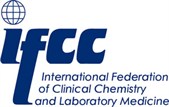
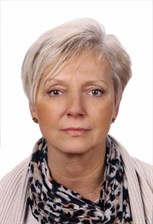
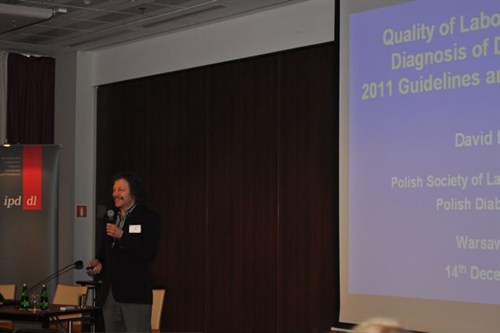 Dr David B. Sacks delivering his lecture
Dr David B. Sacks delivering his lecture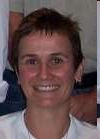
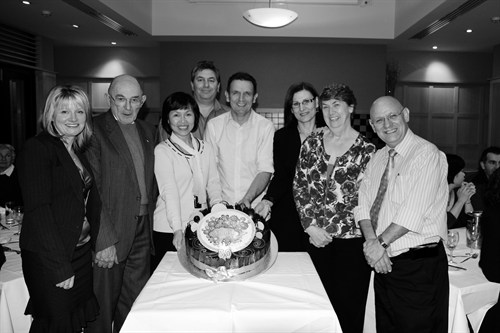 Celebrating the AACB's 50th Birthday:
Celebrating the AACB's 50th Birthday: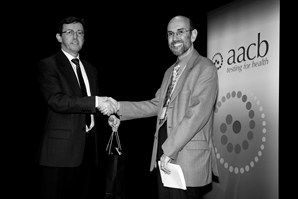
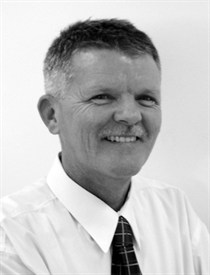
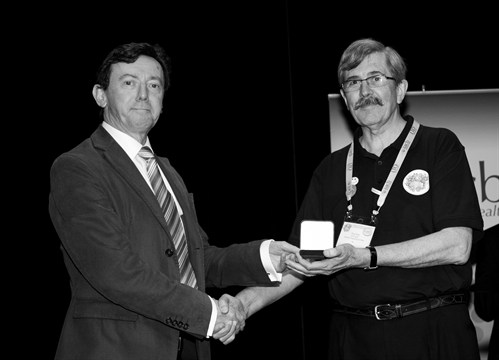
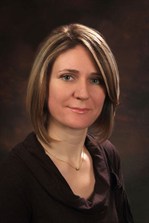 Dr Snežana Jovičić
Dr Snežana Jovičić